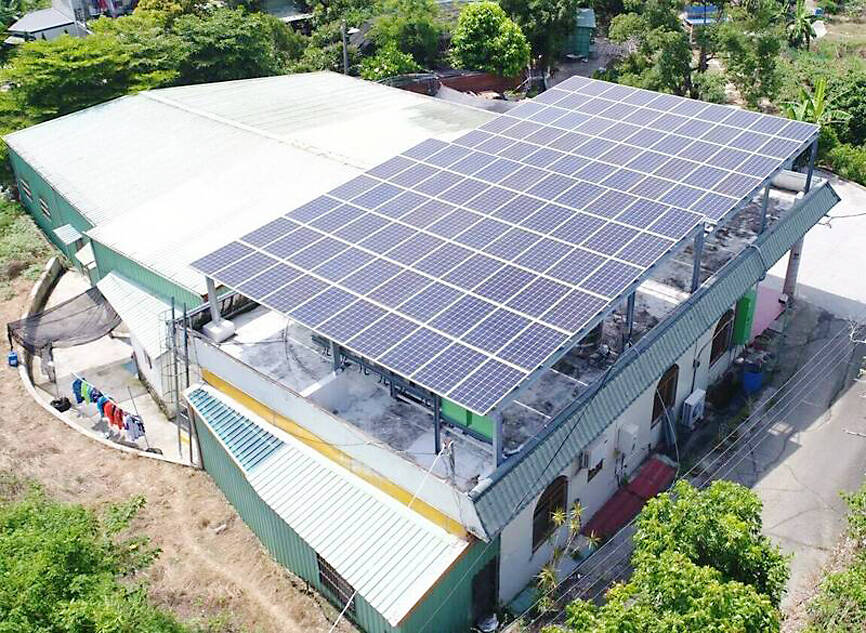The Executive Yuan yesterday approved a four-year plan to offer subsidies of up to NT$300,000 (US$9,248) each to install rooftop solar panels on private residential buildings.
This comes as the Ministry of Economic Affairs moved back a target for solar photovoltaic (PV) installations to 2026.
Owners of buildings with roofs smaller than 1,000m2 and solar energy companies can apply for a subsidy of up to NT$3,000 per kilowatt (kW) of installed capacity, for a total of up to NT$300,000 per project.

Photo: Taipei Times
The program, which is to run from next year to 2028, is projected to cost NT$4.08 billion and increase rooftop power generation by 1.2 gigawatts (GW).
Taiwan has 13.82GW of PV installations, of which 8.76GW, or 63 percent, comes from rooftop solar power systems.
Most of the installations are on medium-sized or large buildings, meaning that small roofs would be the main driver of growth moving forward, Vice Minister of Economic Affairs Lien Ching-chang (連錦漳) said.
Compared with ground-mounted systems, rooftop solar is a more mature technology and is less controversial, the ministry said.
Previously, the economics ministry and the Ministry of the Interior discussed expanding PV installations to all new or renovated buildings with roofs larger than 1,000m2.
For smaller rooftops, the economics ministry has offered subsidies through feed-in-tariff (FIT) rates, which stand at NT$5.7 per kilowatt-hour (kWh), better than the rate for ground-based systems at NT$3.7 per kwH.
The economics ministry said it simplified the application process for households, so that when people register equipment, they can simultaneously apply for the subsidy.
There are five documents required: an application form, identification, equipment registration, a payment receipt and a bank account passbook photocopy, it said.
The economics ministry estimated that the program would attract 120,000 participants.
If they apply for about 10kW each, it would increase total rooftop capacity by 1.2GW, which translates to 1.5 billion kwH per year, it said.
The cost of rooftop solar panel installation is between NT$55,000 and NT$60,000 per kilowatt, Energy Administration Director-General Yu Cheng-wei (游振偉) told a news conference.
Some administrative regions already have PV subsidies in place, he said, adding that the economics ministry’s initiative is meant to support the common goal of achieving net zero emissions.
Last year, renewable energy sources accounted for 9.5 percent of Taiwan’s total electricity generation.
Solar energy accounted for about half of the energy generated from renewables, or between 4 and 5 percent of total electricity generation, economics ministry data showed.
Additional reporting by CNA

‘CORRECT IDENTIFICATION’: Beginning in May, Taiwanese married to Japanese can register their home country as Taiwan in their spouse’s family record, ‘Nikkei Asia’ said The government yesterday thanked Japan for revising rules that would allow Taiwanese nationals married to Japanese citizens to list their home country as “Taiwan” in the official family record database. At present, Taiwanese have to select “China.” Minister of Foreign Affairs Lin Chia-lung (林佳龍) said the new rule, set to be implemented in May, would now “correctly” identify Taiwanese in Japan and help protect their rights, the Ministry of Foreign Affairs said in a statement. The statement was released after Nikkei Asia reported the new policy earlier yesterday. The name and nationality of a non-Japanese person marrying a Japanese national is added to the

AT RISK: The council reiterated that people should seriously consider the necessity of visiting China, after Beijing passed 22 guidelines to punish ‘die-hard’ separatists The Mainland Affairs Council (MAC) has since Jan. 1 last year received 65 petitions regarding Taiwanese who were interrogated or detained in China, MAC Minister Chiu Chui-cheng (邱垂正) said yesterday. Fifty-two either went missing or had their personal freedoms restricted, with some put in criminal detention, while 13 were interrogated and temporarily detained, he said in a radio interview. On June 21 last year, China announced 22 guidelines to punish “die-hard Taiwanese independence separatists,” allowing Chinese courts to try people in absentia. The guidelines are uncivilized and inhumane, allowing Beijing to seize assets and issue the death penalty, with no regard for potential

STILL COMMITTED: The US opposes any forced change to the ‘status quo’ in the Strait, but also does not seek conflict, US Secretary of State Marco Rubio said US President Donald Trump’s administration released US$5.3 billion in previously frozen foreign aid, including US$870 million in security exemptions for programs in Taiwan, a list of exemptions reviewed by Reuters showed. Trump ordered a 90-day pause on foreign aid shortly after taking office on Jan. 20, halting funding for everything from programs that fight starvation and deadly diseases to providing shelters for millions of displaced people across the globe. US Secretary of State Marco Rubio, who has said that all foreign assistance must align with Trump’s “America First” priorities, issued waivers late last month on military aid to Israel and Egypt, the

‘UNITED FRONT’ FRONTS: Barring contact with Huaqiao and Jinan universities is needed to stop China targeting Taiwanese students, the education minister said Taiwan has blacklisted two Chinese universities from conducting academic exchange programs in the nation after reports that the institutes are arms of Beijing’s United Front Work Department, Minister of Education Cheng Ying-yao (鄭英耀) said in an exclusive interview with the Chinese-language Liberty Times (the Taipei Times’ sister paper) published yesterday. China’s Huaqiao University in Xiamen and Quanzhou, as well as Jinan University in Guangzhou, which have 600 and 1,500 Taiwanese on their rolls respectively, are under direct control of the Chinese government’s political warfare branch, Cheng said, citing reports by national security officials. A comprehensive ban on Taiwanese institutions collaborating or